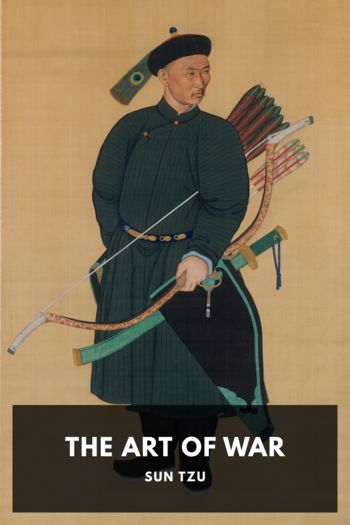The Art of War by Sun Tzu (elon musk reading list TXT) 📕

- Author: Sun Tzu
Book online «The Art of War by Sun Tzu (elon musk reading list TXT) 📕». Author Sun Tzu
Tu Mu says: 糧食薪芻 “Provisions, fuel and fodder.” In order to subdue the rebellious population of Kiangnan, 高潁 Kao Kêng recommended Wên Ti of the Sui dynasty to make periodical raids and burn their stores of grain, a policy which in the long run proved entirely successful. (隋書, ch. 41, fol. 2.) ↩
An example given is the destruction of 袁紹 Yüan Shao’s wagons and impedimenta by Tsʽao Tsʽao in 200 AD. ↩
Tu Mu says that the things contained in 輜 and 庫 are the same. He specifies weapons and other implements, bullion and clothing. Cf. chapter VII, “We may take it then that an army …” ↩
No fewer than four totally diverse explanations of this sentence are given by the commentators, not one of which is quite satisfactory. It is obvious, at any rate, that the ordinary meaning of 隊 (“regiment” or “company”) is here inadmissible. In spite of Tu Mu’s note, 焚其行伍因亂而擊之, I must regard “company burning” (Capt. Calthrop’s rendering) as nonsense pure and simple. We may also, I think, reject the very forced explanation given by Li Chʽüan, Mei Yao-chʽên and Chang Yü, of whom the last-named says: 焚其隊仗使兵無戰具 “burning a regiment’s weapons, so that the soldiers may have nothing to fight with.” That leaves only two solutions open: one, favoured by Chia Lin and Ho Shih, is to take 隊 in the somewhat uncommon sense of “a road,” = 隧. The commentary on a passage in the 穆天子傳, quoted in Kʽang Hsi, defines 隊 (read sui) as 谷中險阻道 “a difficult road leading through a valley.” Here it would stand for the 糧道 “line of supplies,” which might be effectually interrupted if the country roundaout was laid waste with fire. Finally, the interpretation which I have adopted is that given by Tu Yu in the Tʽung Tien. He reads 墜 (which is not absolutely necessary, 隊 chui being sometimes used in the same sense), with the following note: 以火墮敵營中也火墜之法以鐵籠火着箭頭頸强弩射敵營中 “To drop fire into the enemy’s camp. The method by which this may be done is to set the tips of arrows alight by dipping them into a brazier, and then shoot them from powerful crossbows into the enemy’s lines.” ↩
Tsʽao Kung thinks that 姦人 “traitors in the enemy’s camp” are referred to. He thus takes 因 as the efficient cause only. But Chʽên Hao is more likely to be right in saying: 須得其便不獨姦人 “We must have favourable





Comments (0)